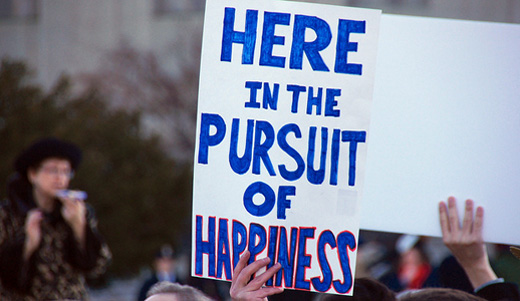
Monumental. That’s how legal experts and human rights activists describe this week’s two cases before the Supreme Court on same-sex marriage. Monumental indeed as the court’s decisions promise to define the nation, which claims the mantle of democracy – based on rights and laws, for generations to come. Are all Americans equal regardless of who they love and choose to marry? Or are these inalienable rights of “life, liberty and pursuit of happiness” only for heterosexuals? This daily news website, which prides itself in fighting for economic, political and democratic rights for all, joins with the majority of Americans who resoundingly say “Yes” to the first question and “No” to the second.
There are more than 1,000 protections and rights – financial, legal and otherwise such as making medical decisions – that go with marriage. Same-sex couples are denied these rights and protections. For working people, marriage equality matters. Like the motto of the labor movement: an injury to one is an injury to all!
Opponents to same-sex marriage argue the institution is solely for a man and a woman, and has been throughout time. Any materialist-based observer of history would differ with that. Frederick Engels, a colleague/comrade of Karl Marx, wrote that the institution of marriage came about as private property emerged, and with it the need of the wealthy owners to have a state that recognized their progenies’ (mainly sons) legal right to continue that ownership – to keep it in the family so to speak. Hence the name of Engels’ seminal work: “Origin of the Family, Private Property and the State.”
This state – as in the United States of America – has a compact with its citizens that guarantees equal rights for all. Yet since its inception this compact has been a point of fierce class and social struggles to define who is considered a citizen, what those rights are and how they are expressed. The struggles to end slavery and pass the 13th, 14th and 15th amendments to the Constitution and the struggle for women’s suffrage and to pass the 19th amendment are just two often-cited examples. But history is filled with many more, and continues to present day struggles – from immigration reform to marriage equality.
Gay and lesbian couples, their allies (including unions) and the mass movement for LGBT rights have helped to expand democracy, which should be seen as a positive for all people. Yet in that struggle – invested ruling powers are threatened. Long held ideologies, gender and cultural constructs, which help keep those powers ruling, may go the way of the belief in a flat Earth. So they fight to hold onto this power, no matter if it’s undemocratic. The far right wing in America, especially the far right of religious institutions, is the most threatened. At least five of the nine Supreme Court justices represent this cabal, yet political and social movements, which influence public opinion, in turn influences legal opinions.
Because of massive shift in public opinion in favor of marriage equality, the court may rule (narrowly) that both California’s Proposition 8 and the 1996 Defense of Marriage Act are unconstitutional. That would be a great victory for democracy. But it wouldn’t end there, as the struggle to implement the democratic gains will continue. That’s part of the promise of a “more perfect union.”
Photo: Supporters of marriage equality gather on the steps of the Supreme Court, March 26, as arguments in the case involving California’s Proposition 8 are being heard. (tedeytan/CC)










